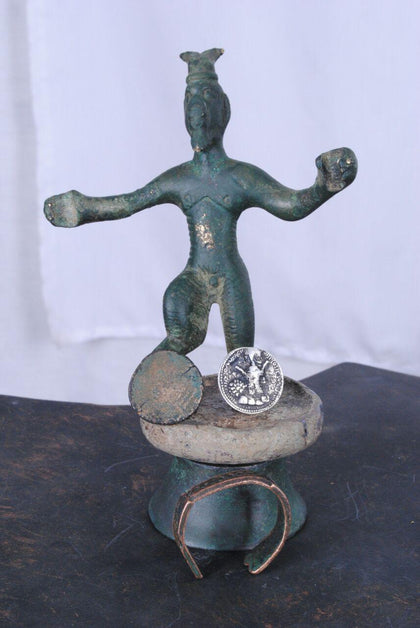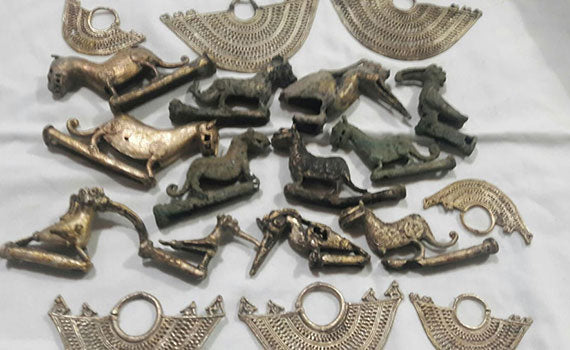Treasure find with OKM Rover C II in the Middle East

Detected with
OKM Rover C II New Edition (2009-2017)
Region: Middle East
Time of origin: 1st century BC
Remarkable Ancient Artifacts Discovered with the Rover C II
One of our esteemed customers recently made an extraordinary discovery in the Middle East using the Rover C II ground scanner. Buried deep beneath the surface, he uncovered a collection of historic artifacts dating back to the first centuries BC — a period marked by cultural exchange, craftsmanship and early forms of settlement development. This impressive find consists of a beautifully crafted statue, multiple ancient coins, an ornate bracelet and a finely shaped bowl.


A Glimpse into the Artistic Skill of Ancient Civilizations
The statue found at the site immediately stands out. Its detailed craftsmanship, elegant posture and preserved contours reflect the artistic capabilities of early cultures in the region. Both the front and back views reveal stylistic features typical of ancient sculptural art — marking this piece as a valuable insight into the symbolic and aesthetic language of its time.


A Treasure Offering Historical and Cultural Depth
The find also includes several ancient coins — each bearing engravings that may provide clues about early rulers, local economies or trade routes active during the first centuries BC. Alongside the coins lies a beautifully preserved bracelet, showcasing intricate metalwork indicative of early jewelry-making traditions. The bowl, likely used for ritual or daily purposes, adds another layer of cultural context to this diverse artifact collection.
Rover C II: Proven Performance in Real-World Conditions
This discovery once again highlights the Rover C II’s reputation as a reliable deep-seeking detector capable of identifying complex underground anomalies. Its combination of ground-penetrating performance and 3D visualization makes it an invaluable tool for treasure hunters and field researchers seeking historically significant artifacts. When paired with skill, patience and proper scanning strategy, the Rover C II becomes a powerful instrument for uncovering the hidden chapters of human history.
Frequently Asked Questions
How deep can the Rover C II detect buried artifacts?
Detection depth varies based on soil conditions and object size, but the Rover C II is designed for deep-level scans and has repeatedly proven its capability in uncovering large and small artifacts several meters below ground.
What type of objects can the Rover C II identify?
The device is ideal for locating metals, cavities, structures and archaeological artifacts. Its 3D visualization helps interpret underground anomalies more effectively.
Why are finds from the first centuries BC significant?
This period represents early cultural development, trade expansion and the rise of ancient settlements. Objects from this era offer valuable insight into craftsmanship, symbolism and daily life.
Is the Rover C II suitable for professional archaeological research?
Yes. Its deep-reaching capabilities and advanced data analysis make it a popular choice among professionals, researchers and serious detectorists.
How can I improve my chances of making similar finds?
Consistent scanning, understanding soil conditions, using correct detector settings and performing multiple scans increase accuracy. Combining these techniques with advanced detectors like the Rover C II significantly enhances success rates.
Get Rewarded for Your Treasure Finds
You have also made discoveries and detected amazing artifacts and would like to share them (anonymously)? We look forward to reading and publishing your success stories!


